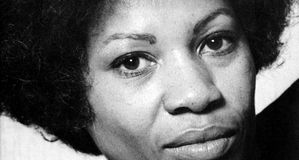Stamp Paid and the Power of Self-Actualization in Beloved
By
2009, Vol. 1 No. 11 | pg. 1/1
KEYWORDS:
A character in Toni Morrison's Beloved whose crucial importance to both the plot and thematic intent of the book is Stamp Paid. He is a character with limited space devoted to him, but whose every action is a catalyst for the book as a whole. He is a highly admirable character, but has serious warts that are never directly addressed in the novel but are there nonetheless; he is also an example for everyone else in the book to follow. Stamp Paid is introduced in a rather glowing manner. He is the reliable ferryman over the Ohio River, who takes Sethe to 124, working off the kind of antiquated methods that resonate with a quaint nobility in the GPS era: the system he works out telling those on the other side of the river when a crossing is coming and whether or not a child will be on board. (108) He is also introduced as an eminently decent and just-minded person when he has his nephew give up his coat for Denver, the newborn. When the boy complains, Stamp tells the boy that he can have it if he can stomach taking it off the baby, but if he does to "go on 'way somewhere and don't come back."(109) The logic is inscrutable. It is the boy's jacket, so he has the valid right to take it if he so pleases, but that is not the kind of person he wants on his crew and will not allow it. It's not only the logic, but how clear it makes the case to the nephew and teaches him a lesson in basic decency. A glowing introduction indeed, but the luster wears. The next time he is seen illustrates Stamp Paid's flaw, although it is almost impossible for the reader to pick up on it the first time through. He goes to 124 and sees Sethe, referred to as "the mother he handed a piece of fried eel to," and Denver, referred to as "the baby he had tied up in his nephew's jacket," he decides to, "for some private reason of his own," go into the thick, sharp brush and cut himself up badly in the process of picking two buckets worth of blackberries. The words "private reason of his own," are of particular importance. This, combined with the later introduction to the belief that spawned his name change, seems to point to a man whose good deeds may not be selfless. Indeed, going to pick the blackberries is a somewhat empty gesture in comparison to his previous occupation as savior. The kind of gesture that connotes someone who has an internal need to make that sort of gesture, not someone who will make the gesture only because it is needed, someone who may be secretly doing what is good for others because it is good for him.His first act in the novel directly resulted in the introduction of Sethe to her "28 days...of unslaved life," a time when she was accepted within the community and knew what life as a dignified human being was like, something very hard for a former slave to accomplish. (111) His second act indirectly resulted in the exclusion of Baby Suggs and Sethe from the community. The blackberries lit a spark in Baby and she went on to turn two buckets of blackberries into "a feast for ninety people." This resulted in those ninety people, plus those in the community who did not attend, to shun Baby Suggs for what they considered to be excessive pride. This is why no one went ahead to warn them of ominous whites headed in their direction, which led to Sethe feeling she had no option but to try and kill her children, because a mother who has had her sense of self ripped away by slavery and can only feel self-realized through her children might think death at the hands of their own mother is a better fate than getting caught up in servitude. This act makes the community recoil in terror at what she had done, and keep her deep in the periphery for her own perceived excessive pride in an ascending sequence of trite actions from all involved, especially the community. (201-202) This points to the importance of Stamp Paid in this novel. An act as small as picking two buckets of blackberries results in the existential state of those living, and those who ran away from, 124. It can also be read to underscore Morrison's perspective on his acts of selflessness being acts of selfishness. His ferrying Sethe and Denver over the river, a situation where acts of selflessness are required and admirable, and his picking the blackberries resulted in two perfectly opposed states of being for Sethe, pointing to a substantive difference in the acts themselves. Morrison is not placing all the blame on Stamp Paid. She reserves a lot of that for the community, but this point can not be ignored when investigating a character of such importance to the novel. Two thirds of the way through the book, when he goes to 124 in his first attempt to gain re-entry, Morrison finally gives us the passage that probes deeper into Stamp Paid's psychological makeup:
Stamp Paid's guilt over his showing Paul D the clipping, another ultimately empty act of nobility with tragic consequences, and also the shame he feels on behalf of himself and the entire community for their neglect of 124, eventually leads him to try to rectify his actions. He starts to get the community just thinking about 124 when he visits Ella and tries to get her to take in Paul D. He doesn't need to do much with the community though, as Beloved's consumption of Sethe, a result of Paul D leaving and violently taking away that part of her identity that was not "mother," had forced Denver to grow up enough to where she could get the community involved on her own. This is ironic, since Stamp's guilt over what he had done was centered around Denver, whom he had wrapped in a coat, ferried across the river and snatched form the path of an axe. His next act was to go down to the church where he had heard Paul D was staying. As it goes, it is easier to convince the community take Paul in than it is to convince Paul D to go to the community. He wants to apologize to Paul D and to try to rectify the damage he had done. It doesn't necessarily work. He does get Paul D thinking about things in a slightly different way, because the next time he is seen is on the porch of 124, in a much better headspace. Although he seems to have helped, Paul D's state at the end of the novel seems more of a self-actualization than the result of Stamp Paid's talk with him. That is the crux of Stamp Paid's character: identity. The conversation with Paul D is when Stamp Paid finally reveals the origin of the name he gave himself. Up to this point, it is easy to assume that his name is a result of that same pride and sly selfishness in his acts. He gives himself that name instead of killing his wife. The name change, and the new identity it creates, leads to his role as ferryman savior. He sees it as his way of helping people pay their own debts. This is Stamp's triumph and his flaw. He had the strength and inner reserve to not let the violation of his wife not consume him. Seems Paul D's tin can heart isn't the only way to survive servitude. He forges a transcendent identity for himself, self-actualized, a near impossibility for a former slave. He has pride in that identity, though, and, due to his time in servitude, feels uneasy in it, like it might go away. So he constantly feeds it. Every visit is "beneficial," and all he expects is the open door because that is the best way to re-affirm his self-forged identity. It can be argued that his cataclysmic effect on the novel in the first two thirds are due to this strong identity he gave himself, while others like Paul D and Sethe walked around afraid of letting themselves become fully realized. His talk doesn't seem to have a huge impact on Paul D because it's time he took something for himself, without fear. To love is his self-actualization. Denver's is adulthood, indirectly spawned by her guardian angels showing the clipping to Paul D. Sethe's self-actualization is allowing herself an identity other than "mother." By the end she has resigned, much like Baby Suggs, under a blanket in a self-imposed madness that is much easier for her to bear than all the events that had happened since Paul D showed up and threw Beloved's spirit around the kitchen. In the end the community had eradicated Beloved, and Sethe's overwhelming mix of pride and shame, two feelings which often go hand in hand, put her in an infantile state. For her, it is either mother or nothing. Until Paul D shows up, the only chance she has at any other kind of life, especially now that Denver is well capable of self- sufficiency. In the end, there is hope that Paul D and Sethe will be able to heal the wounds of slavery as well as they can be healed for each other. That they will achieve the self-actualization Stamp Paid achieved when he changed his name instead of killing his wife. Stamp Paid is a crucial character for the book. Baby Suggs was the only other character to achieve a self-actualization in the book prior to the end, begun by her refusal to give up the name Baby Suggs for Jenny Whitlow. He is introduced in glowing terms because he is a beacon for the post-slavery world. That being said, the darker side of his character can not be ignored. His identity was forged in reaction against the institution, so he will never be able to be truly free from it. That fact provides him with a sense that it could go at any time, forcing him to constantly feed its need for affirmation. It also fills him with a pride that, given his life as a sub- human in the slave world, is hard to indict him for in the end, unattractive thought it may be. The story does not provide a real end for Stamp. His last scene is when he is talking to Paul D about the peace at 124. He lasts mentions Denver as "his heart," (313) Denver represents his identity to himself. He saved her many times, and the act which he tore himself up over, especially in relation to Denver, is what forces her growth. He feels guilty for telling Paul D what happened, but maybe he shouldn't. If Beloved, both book and character, teach anything it is that the past can not be ignored. Stamp Paid made it so they could ignore it no longer. Without acknowledging the past, it will enslave you. Not free from the past, but no longer cripplingly controlled by it, as the ladies of 124 and Paul D find themselves at the end, is the only way these former slaves can live a contented life of their own. Much like Stamp Paid seems to have managed to do. Morrison, Toni. Beloved a novel. New York: Penguin, 1998. Suggested Reading from Inquiries Journal
Inquiries Journal provides undergraduate and graduate students around the world a platform for the wide dissemination of academic work over a range of core disciplines. Representing the work of students from hundreds of institutions around the globe, Inquiries Journal's large database of academic articles is completely free. Learn more | Blog | Submit Latest in Literature |


















